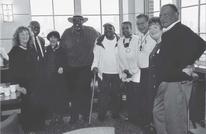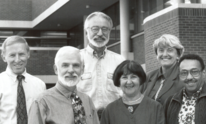
At the age of 99, Esther Wattenberg is putting the capstone on a distinguished and widely celebrated career. She has only recently begun to slow down her schedule of meetings with colleagues and authoring of her admired Notes from a Cluttered Desk. And it is only recently that she began to accept the retrospective profiles and awards that come in the twilight of one’s career. CURA has been one of Wattenberg’s homes for nearly all of our 50 years, so we join in and say “Thank you” to Esther Wattenberg for being a part of what makes us special.
Early in her career, Wattenberg recognized a significant need for child protection reform and set out to identify the systemic changes needed to improve the lives of vulnerable children and families. Her approach to this was a lifelong mission of in-depth research, partnerships, advocacy, and writing and reflecting about her experiences.
"Concentrating on improving the linkages between school social workers and child protection staff should be paramount in future planning for child welfare."
—Esther Wattenberg

Wattenberg was born in London, Ontario in 1919. She received a Bachelor of Arts from the University of Western Ontario, a Master of Arts from the University of Toronto, and an additional Master of Arts from the School of Social Service Administration at the University of Chicago. Later, she completed post-graduate work at the London School of Economics.
In 1964, Wattenberg joined the faculty at the University of Minnesota after moving to Minneapolis with her husband—the prominent cancer researcher Lee Wattenberg—who was attending medical school at the University.
In September 1967, the University of Minnesota began a New Careers program with Wattenberg as Project Director. This program provided an innovative mix of sheltered education, employment, and social support by assisting low income people's entrance into the job market, by improving the quality of social services by helping the providers relate and emphasize with their clientele, and by creating socially useful jobs at the entry level.
By 1972, Esther was appointed both as an associate professor in the School of Social Work and as a researcher for CURA and sometime later was promoted to professor of social work and coordinator of the CURA social services program.
In 1991 Wattenberg published the Study of Paternity Decisions of Young, Unmarried Parents with over $250,000 in funding from the McKnight and Ford foundations. This research led to every out-of-wedlock child finding their chances improved for a legal connection to a father.
In 1992 Wattenberg co-founded and directed the Advanced Studies in Child Welfare (CASCW) with Jean Quam, then director of the School of Social Work, in a joint effort with the Minnesota Department of Health and Human Services. CASCW became the home of federal Title IV-E funding for Child Welfare Scholars, which provided specialized training related to child protection, foster care, and permanency that the School of Social Work didn’t have at the time. Although Wattenberg left her position as director in 2001, CASCW continues her mission of improving the wellbeing of children and families by educating human service professionals, fostering collaborations across systems and disciplines, informing policy makers and the public, and expanding the child welfare knowledge base.
As a writer, Wattenberg has had opinion pieces published in The New York Times and Star Tribune and reflected on her research and methods as editor for the CASCW publication Practice Notes, a monograph linking research and best practice for child welfare practitioners.
"Kin and friends, neighbors and daycare providers, all of us, should be part of a young child's protection system." —Esther Wattenberg, Star Tribune, 1999
Today Wattenberg is not quite done. Until recently, she maintained office hours and responsibilities in her role as professor of social work. Her famous “cluttered desk” at CURA remained a testament to her work and served as inspiration for her latest series of writing Notes from a Cluttered Desk. She is also a member of many local and national boards and organizations, including the Hennepin County Children’s Justice Initiative.
It is difficult to sum up a career and life like Wattenberg's, but in an interview for the CASCW publication CW360 Child Welfare Reform, Esther pinpoints four pillars that do just that:
- The capacity to experience love in a close relationship;
- To be a loving member of a family;
- The capacity for productive work;
- And the capacity to contribute a positive presence within a community.
Considering Wattenberg’s endless work and significant impact on the community, all while raising six children alongside her longtime husband Lee, it is evident that Wattenberg has had both a successful life and a meaningful career.

Significant Publications:
- Study of Paternity Decisions of Young, Unmarried Parents (1991)
- Progress Report on Education, Minneapolis New Careers Program (1968)
- Child Welfare System, Under Fire, Staggers On, The New York Times (1995)
- A Collection of Editorials By Esther Wattenberg
* For a full list of Esther Wattenberg's publications with links, click here.